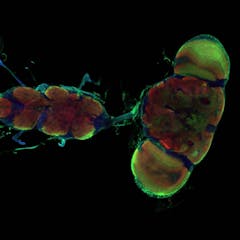
Articles on Cognition
Displaying 61 - 80 of 154 articles

Are you good at changing perspectives? If so, it may benefit you in more ways than you imagine.

Analysis of 46 studies indicates that there’s still a lot of uncertainty about the long-term impacts of digital device use on cognition.

It appears that the South African Cape south coast’s dunes and beaches formed a vast canvas of sand on which our ancestors could leave their mark.

Adaptable neurons are tied to learning and memory but also to neurological disorders. By studying fruit flies, researchers found a mechanism that controls neuroplasticity.

High levels of cognitive performance and effective teamwork are crucial to long-duration space missions.

Anti-inflammatory drugs may be able to reverse cognitive decline in the future.

The brain is surprisingly changeable.

During Mental Health Week, let’s look at why some people, such as those experiencing depression or substance dependency, struggle to make decisions like everyone else.

Hindu philosophy believes the soul to be immortal. Death is considered to be the end of only physical incarnation, as the soul continues its journey of multiple births until its final liberation.

Journalists use real people’s stories to ‘humanize’ the news. But these tales – whether harrowing or heartwarming – can be misleading about the pandemic’s greatest threats.

A bioengineer explains how a clearer picture of brain structure and function may fine-tune the ways brain surgery attempts to correct structure and medication tries to correct function.

Whether in situations relating to scientific consensus, economic history or current political events, denialism has its roots in what psychologists call ‘motivated reasoning.’

If you want to boost your energy and mood and feel more alert, get moving instead of getting coffee.

Involving family and friends in decisions or rethinking the meaning of “getting back to normal” helps protect against cognitive bias and its harmful consequences.

The artefact comes from deposits dated to more than 60,000 years ago. It closely resembles thousands of bone arrowheads used by the indigenous San hunter-gatherers from the 18th to the 20th centuries.

Is it safe to nip out for milk? Should I download the COVIDSafe app? Is it OK to wear my pyjamas in a Zoom meeting? All these extra decisions are taking their toll.

A quirk of psychology that affects the way people learn from others may have helped unlock the complicated technologies and rituals that human culture hinges on.

Dance therapy is effective in treating depression, improving memory and neuroplasticity in older adults and improving executive function in those with Parkinson’s disease.

Do you ever find you suddenly need to turn off the radio so you can concentrate on what you’re doing? It’s because you only have a finite amount of attention, for particular types of tasks at least.

The ‘contexual-binding theory’ suggests memories are easier to retrieve when your brain is in a similar context to when the memory was first formed. Food for thought if you’re cramming for an exam.
